8 most useful features in Ubuntu Unity Quicklists
TipsMake.com - One of the most useful features in Unity (Ubuntu Natty) is the quicklists feature on the application icon. For example, you might have to click on the Google Chrome icon and access the option to open incognito window (auto-erase all web history, everything you type, cookies, passwords etc. after turning off browser, maximum security), or right click on the Gmail icon and select the option 'Compose New Email'. For those who are new to Windows 7, this feature is very similar to the jumplist feature on the Windows 7 taskbar.
How to add Unity Quicklists?
Ubuntu provides an API for Unity and anyone can create their own Quicklists with a different edit in the configuration file. Currently, there is no way to easily add a quicklist item. Below is a summary of the steps needed to add a quicklist entry:
1. Copy the configuration configuration file to the Home folder.
2. Open the desktop configuration file with gedit.
3. Add the quicklist code to the file. Syntax as below:
# adapted from Ubuntu wiki. Mô tả là cho gnome-screenshot
X-Ayatana-Desktop-Shortcuts = Screen; Window
[Screen Shortcut Group]
Name = Take a screenshot of the whole screen
Exec = gnome-screenshot
TargetEnvironment = Unity
[Window Shortcut Group]
Name = Take a screenshot of current window
Exec = gnome-screenshot -w
TargetEnvironment = Unity
The X-Ayatana-Desktop-Shortcuts code only points to the entries that appear whenever you right-click the application's icon. The following [XXX shortcut Group] followed by action for each entry.
Some utilities of the Unity Quicklists
1. Add Private / Safe mode, Profile Manager and site often access Firefox icons.
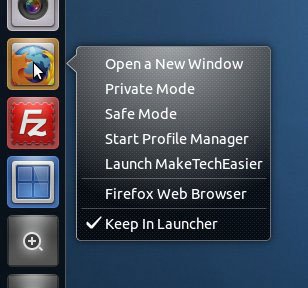
Copy Firefox's desktop configuration file to the Home folder.
sudo cp /usr/share/applications/firefox.desktop ~ / .local / share / applications
Open this file with gedit.
sudo gedit ~ / .local / share / applications / firefox.desktop
Replace the line
X-Ayatana-Desktop-Shortcuts = NewWindow;
equal
X-Ayatana-Desktop-Shortcuts = NewWindow; Private; Safe; ProfileManager; MakeTechEasier
#feel free to change the name of your frequently accessed site
Next, add the following line of code to the end of the file:
[Private Shortcut Group]
Name = Private Mode
Exec = firefox -private-toggle
TargetEnvironment = Unity
[Safe Shortcut Group]
Safe = Name
Exec = firefox -safe-mode
TargetEnvironment = Unity
[ProfileManager Shortcut Group]
Name = Start Profile Manager
Exec = firefox -ProfileManager
TargetEnvironment = Unity
[MakeTechEasier Shortcut Group]
Name = Launch MakeTechEasier
Exec = firefox "maketecheasier.com"
TargetEnvironment = Unity
Save and close the file. Finally, restart Unity
unity --replace
2. Add new window and Incognito mode to Google Chrome
Assume that you recently installed Google Chrome in Ubuntu.

Run the following command:
sudo cp /usr/share/applications/google-chrome.desktop ~ / .local / share / applications
sudo gedit ~ / .local / share / applications / google-chrome.desktop
Add the following code to the end of the file:
X-Ayatana-Desktop-Shortcuts = NewWindow; Incognito
[NewWindow Shortcut Group]
Name = Open New Window
Exec = google-chrome
TargetEnvironment = Unity
[Incognito Shortcut Group]
Name = Incognito Mode
--Incognito = google-chrome --incognito
TargetEnvironment = Unity
Save and close the file. Restart Unity
unity --replace
3. Add Favorite and Bookmarks to the Home Folder
Allows you to access different folders directly from the launcher.
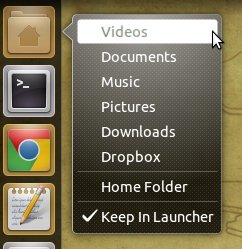
Run the following command:
sudo cp /usr/share/applications/nautilus-home.desktop ~ / .local / share / applications
sudo gedit ~ / .local / share / applications / nautilus-home.desktop
Scroll down and replace the line:
OnlyShowIn = GNOME;
equal
OnlyShowIn = GNOME; Unity;
Add the following code to the end of the file:
X-Ayatana-Desktop-Shortcuts = Videos; Documents; Music; Pictures; Downloads; Dropbox
[Shortcut Videos Group]
Name = Videos
Exec = nautilus Videos
TargetEnvironment = Unity
[Documents Shortcut Group]
Name = Documents
Exec = nautilus Documents
TargetEnvironment = Unity
[Music Shortcut Group]
Name = Music
Exec = nautilus Music
TargetEnvironment = Unity
[Pictures Shortcut Group]
Name = Pictures
Exec = nautilus Pictures
TargetEnvironment = Unity
[Downloads Shortcut Group]
Name = Downloads
Exec = nautilus Downloads
TargetEnvironment = Unity
[Dropbox Shortcut Group]
Name = Dropbox
Exec = nautilus Dropbox
TargetEnvironment = Unity
Save and close the file. Restart Unity
unity --replace
4. Help LibreOffice Start Center more convenient
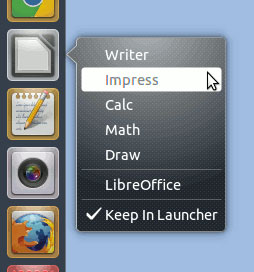
Run the following command:
sudo cp /usr/share/applications/libreoffice-startcenter.desktop ~ / .local / share / applications
sudo gedit ~ / .local / share / applications / libreoffice-startcenter.desktop
Add the following code to the end of the file:
X-Ayatana-Desktop-Shortcuts = Writer; Impress; Calc; Math; Draw
[Shortcut Group Writer]
Name = Writer
Exec = libreoffice -writer% U
TargetEnvironment = Unity
[Impress Shortcut Group]
Name = Impress
Exec = libreoffice -impress% U
TargetEnvironment = Unity
[Calc Shortcut Group]
Name = Calc
Exec = libreoffice -calc% U
TargetEnvironment = Unity
[Math Shortcut Group]
Name = Math
Exec = libreoffice -math% U
TargetEnvironment = Unity
[Draw Shortcut Group]
Name = Draw
Exec = libreoffice -draw% U
TargetEnvironment = Unity
Save and close the file. Restart Unity
unity --replace
5. Add custom commands to Terminal
Terminal is not an application you use often. However, if you often use it, there will be some commands you often have to use. Users can add these commands to the quicklist for easier access.
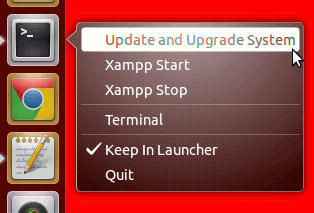
Run the command:
sudo cp /usr/share/applications/gnome-terminal.desktop ~ / .local / share / applications
sudo gedit ~ / .local / share / applications / gnome-terminal.desktop
Scroll down and replace the line:
OnlyShowIn = GNOME;
equal
OnlyShowIn = GNOME; Unity;
Next, add the following code at the end of the file:
X-Ayatana-Desktop-Shortcuts = UpdateUpgrade; XamppStart; XamppStop;
[UpdateUpgrade Shortcut Group]
Name = Update and Upgrade System
Exec = gnome-terminal --command "sudo apt-get update && sudo apt-get upgrade"
TargetEnvironment = Unity
[XamppStart Shortcut Group]
Name = Xampp Start
Exec = gnome-terminal --command "sudo / opt / lampp / lampp start"
TargetEnvironment = Unity
[XamppStop Shortcut Group]
Name = Xampp Stop
Exec = gnome-terminal --command "sudo / opt / lampp / lampp stop"
TargetEnvironment = Unity
Save and close the file. Restart Unity
unity --replace
6. Create a Google Services Center
If you use Google services, this will definitely be very helpful for you.
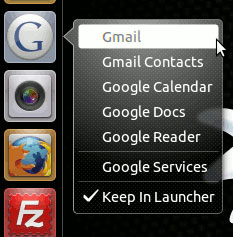
Open a text editor and copy / paste the following code:
[Desktop Entry]
Version = 1.0
Name = Google Services
Exec = / opt / google / chrome / google-chrome
Icon = / filepath / to / google-icon.png #change this filepath to the actual filepath icon
Terminal = false
Type = Application
Categories = Network; WebBrowser;
X-Ayatana-Desktop-Shortcuts = Gmail; Contacts; Calendar; Docs; Reader;
[Gmail Shortcut Group]
Name = Gmail
Exec = xdg-open https://gmail.com
TargetEnvironment = Unity
[Contacts Shortcut Group]
Name = Gmail Contacts
Exec = xdg-open https://www.google.com/contacts
TargetEnvironment = Unity
[Calendar Shortcut Group]
Name = Google Calendar
Exec = xdg-open https://calendar.google.com
TargetEnvironment = Unity
[Docs Shortcut Group]
Name = Google Docs
Exec = xdg-open https://docs.google.com
TargetEnvironment = Unity
[Reader Shortcut Group]
Name = Google Reader
Exec = xdg-open https://google.com/reader
TargetEnvironment = Unity
Remember to change the file path icon. (You can download the icon of Google used here). The above code applies to Google Chrome. You can change it to use Firefox or other browsers if you want.
Save the file with the name ' google-services.desktop ' in the folder ' /home/username/.local/share/applications folder '
Next, drag this file to the launcher.
7. Add shortcuts to Google
Instead of accessing Google services, in case you want quick access to many tasks in Google, such as creating a new email, adding a calendar, opening a doc data, . here's how You can do it:
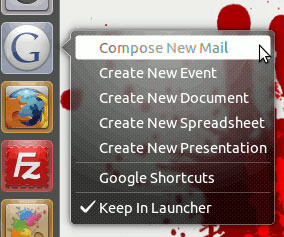
Open a text editor and copy / paste the following code:
[Desktop Entry]
Version = 1.0
Name = Google Shortcuts
Exec = / opt / google / chrome / google-chrome
Icon = / filepath / to / google-icon.png #change this filepath to the actual filepath icon
Terminal = false
Type = Application
Categories = Network; WebBrowser;
X-Ayatana-Desktop-Shortcuts = Gmail; Calendar; Docs; Spreadsheet; Presentation;
[Gmail Shortcut Group]
Name = Compose New Mail
Exec = xdg-open https://mail.google.com/mail/?shva=1#compose
TargetEnvironment = Unity
[Calendar Shortcut Group]
Name = Create New Event
Exec = xdg-open https://www.google.com/calendar/event?action=TEMPLATE
TargetEnvironment = Unity
[Docs Shortcut Group]
Name = Create New Document
Exec = xdg-open https://docs.google.com/document/create?hl=en
TargetEnvironment = Unity
[Spreadsheet Shortcut Group]
Name = Create New Spreadsheet
Exec = xdg-open https://spreadsheets.google.com/ccc?new&hl=en
TargetEnvironment = Unity
[Presentation Shortcut Group]
Name = Create New Presentation
Exec = xdg-open https://docs.google.com/present/create?hl=en
TargetEnvironment = Unity
Remember to change the file path icon.
Save this file as ' google-shortcuts.desktop ' in the folder ' /home/username/.local/share/applications folder '
Next, drag this file to the launcher.
8. Quickly add PPA to Ubuntu Software Center
The method we often use when adding PPA (Personal Package Archive) is through the terminal. However, this may be a more effective way.
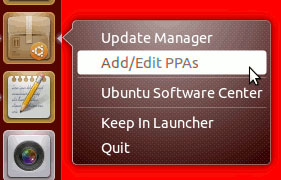
Run the command:
sudo cp /usr/share/applications/ubuntu-software-center.desktop ~ / .local / share / applications
sudo gedit ~ / .local / share / applications / ubuntu-software-center.desktop
Add the following code at the end of the file:
X-Ayatana-Desktop-Shortcuts = SoftwareProperties; SoftwareSources;
[SoftwareProperties Shortcut Group]
Name = Update Manager
Exec = update-manager -c% u
TargetEnvironment = Unity
[SoftwareSources Shortcut Group]
Name = Add / Edit PPAs
Exec = gksu software-properties-gtk
TargetEnvironment = Unity
Save and close the file. Restart Restart Unity
unity --replace
The above is only a small part of what you can do with Unity quicklists. Users can also see AskUbuntu for more quicklists.
Note : If after adding the quicklist code and it causes trouble for the system, you can easily restore the system by deleting the .desktop file separately from the /home/username/.local/share/applications folder and initializing it. Unity. Good luck.